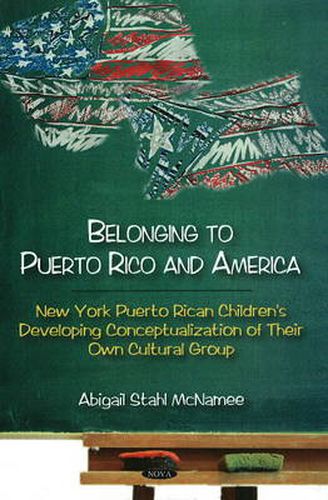Readings Newsletter
Become a Readings Member to make your shopping experience even easier.
Sign in or sign up for free!
You’re not far away from qualifying for FREE standard shipping within Australia
You’ve qualified for FREE standard shipping within Australia
The cart is loading…






This book is based on a study which investigates the developing conceptualisation of twenty-four first, third, and fifth-grade New York Puerto Rican children of their own cultural group. Unique to the study is the notion that children are developing a conceptualisation of a cultural group and that this conceptualisation begins quiet early, within the first decade of life. While the study focuses on one group, it raises the probability that the immigrant children of other cultural groups are also developing a conceptualisation of their group as they reconcile two primary, but different cultures. The study may stimulate similar studies with children of other cultural groups as they immigrate to a new country. The twenty-four children were individually asked to respond to interview questions aimed at eliciting their conceptualisation of Puerto Ricaness . Given the young age of the children, oral questions were often supported with manipulatives including miniature dolls and photographs representing different cultural groups, marker and paper for drawing. The study focused on nineteen domains and their content which emerge as relevant organisers of children thinking about their cultural group: twelve domains relevant to Puerto Rican people, six domains relevant to the country of Puerto Rico, and one domain relevant to the dual life of Puerto Ricans as they live in the United sates while maintaining physical and/or psychological contact with Puerto Rico. Analysis of the data was organised around patterns in the children’s responses related to frequency of reference to each of the nineteen domains (Global Conceptualisation, Differentiated Conceptualisation, Integrated Conceptualisation, and Hierarchically Integrated Conceptualisation), and emerging themselves in the children’s conceptualisation.
$9.00 standard shipping within Australia
FREE standard shipping within Australia for orders over $100.00
Express & International shipping calculated at checkout
This book is based on a study which investigates the developing conceptualisation of twenty-four first, third, and fifth-grade New York Puerto Rican children of their own cultural group. Unique to the study is the notion that children are developing a conceptualisation of a cultural group and that this conceptualisation begins quiet early, within the first decade of life. While the study focuses on one group, it raises the probability that the immigrant children of other cultural groups are also developing a conceptualisation of their group as they reconcile two primary, but different cultures. The study may stimulate similar studies with children of other cultural groups as they immigrate to a new country. The twenty-four children were individually asked to respond to interview questions aimed at eliciting their conceptualisation of Puerto Ricaness . Given the young age of the children, oral questions were often supported with manipulatives including miniature dolls and photographs representing different cultural groups, marker and paper for drawing. The study focused on nineteen domains and their content which emerge as relevant organisers of children thinking about their cultural group: twelve domains relevant to Puerto Rican people, six domains relevant to the country of Puerto Rico, and one domain relevant to the dual life of Puerto Ricans as they live in the United sates while maintaining physical and/or psychological contact with Puerto Rico. Analysis of the data was organised around patterns in the children’s responses related to frequency of reference to each of the nineteen domains (Global Conceptualisation, Differentiated Conceptualisation, Integrated Conceptualisation, and Hierarchically Integrated Conceptualisation), and emerging themselves in the children’s conceptualisation.